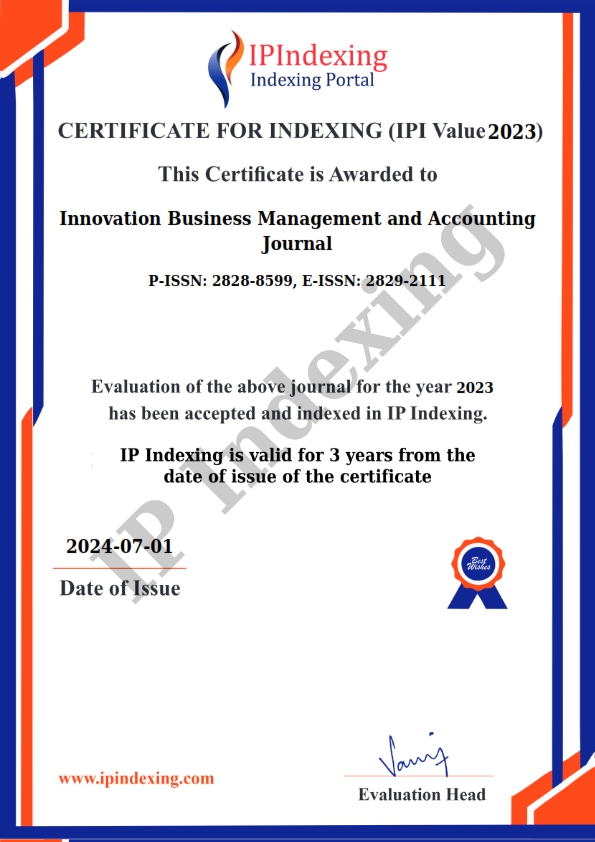Transforming Motivation into Competitive Advantage: An Empirical Study
DOI:
https://doi.org/10.56070/ibmaj.2024.031Keywords:
Customer Satisfaction, Literature Review, Motivation, Organizational PerformanceAbstract
This study aims to explore the relationship between effective motivational strategies and business success in a competitive environment. Using empirical analysis and literature review, this study investigates how various motivational programs can improve employee engagement, satisfaction, and performance. The methods used include surveys and interviews with employees from various companies, as well as statistical analysis to identify the relationship between motivational factors and organizational outcomes. The results show that companies that implement comprehensive motivational strategies experience significant improvements in performance measures, including productivity, output quality, and customer satisfaction. Incentive systems that recognize employee contributions and career development initiatives have been shown to significantly improve employee morale and retention. Data analysis shows that organizations that prioritize motivational methods have lower turnover rates and higher employee commitment, as well as outperform their peers in terms of profitability and customer satisfaction. In conclusion, this study emphasizes the importance of effective motivational strategies as a strategic investment to achieve competitive advantage and long-term business success. By creating a work environment that supports and rewards employees, companies can achieve sustainable growth in a changing marketplace.
Downloads
References
Chaudhuri, S., Arora, R., & Roy, P. (2020). Work–Life balance policies and organisational outcomes–a review of literature from the Indian context. Industrial and Commercial Training, 52(3), 155-170. https://doi.org/10.1108/ICT-01-2019-0003
Girdwichai, L., & Sriviboon, C. (2020). Employee motivation and performance: Do the work environment and the training matter?. Journal of Security & Sustainability Issues, 9. https://doi.org/10.9770/jssi.2020.9.J(4)
Green, Z. A. (2022). Character strengths intervention for nurturing well‐being among Pakistan's university students: A mixed‐method study. Applied Psychology: Health and Well‐Being, 14(1), 252-277. https://doi.org/10.1111/aphw.12301
Jalilianhasanpour, R., Asadollahi, S., & Yousem, D. M. (2021). Creating joy in the workplace. European Journal of Radiology, 145, 110019. https://doi.org/10.1016/j.ejrad.2021.110019
Kosasih, K., Yuliaty, F., Wardhana, M. G., Paramarta, V., & Kartamihardja, S. (2023). Revolutionizing business management: strategic hr optimization for sustainable profitability in indonesia's technological landscape. International journal of economic literature, 1(1), 49-62.
Nguyen, P. T., Yandi, A., & Mahaputra, M. R. (2020). Factors that influence employee performance: motivation, leadership, environment, culture organization, work achievement, competence and compensation (A study of human resource management literature studies). Dinasti International Journal of Digital Business Management, 1(4), 645-662. https://doi.org/10.31933/dijdbm.v1i4.389
Saks, A. M. (2022). Caring human resources management and employee engagement. Human resource management review, 32(3), 100835. https://doi.org/10.1016/j.hrmr.2021.100835
Schneider, S., & Kokshagina, O. (2021). Digital transformation: What we have learned (thus far) and what is next. Creativity and innovation management, 30(2), 384-411. https://doi.org/10.1111/caim.12414
Suhermin, S., Kurniawan, G., Bon, A. T., & Sulistyan, R. B. (2023). Performance Improvement Model: Commitment Development Based on Empowering and Organizational Learning. EKUITAS (Jurnal Ekonomi dan Keuangan), 7(3), 373-393. https://doi.org/10.24034/j25485024.y2023.v7.i3.5777
Valdez, J. P. M., Datu, J. A. D., & Chu, S. K. W. (2022). Gratitude intervention optimizes effective learning outcomes in Filipino high school students: A mixed-methods study. Computers & Education, 176, 104268. https://doi.org/10.1016/j.compedu.2021.104268
Victor, J. A., & Hoole, C. (2021). Rejuvenating the rewards typology: Qualitative insights into reward preferences. SA Journal of Industrial Psychology, 47(1), 1-17. http://doi.org/10.4102/sajip.v47i0.1880
Downloads
Published
How to Cite
Issue
Section
License
Copyright (c) 2024 Ambati Sharma, Naser Kumar, Joseph Bath Kimatha

This work is licensed under a Creative Commons Attribution-ShareAlike 4.0 International License.



